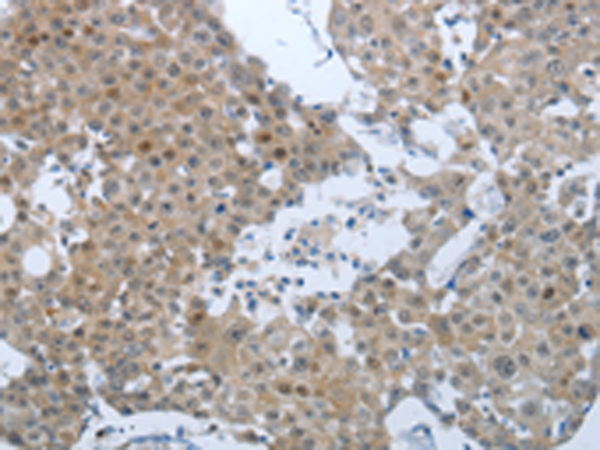
| WB | 咨询技术 | Human,Mouse,Rat |
| IF | 咨询技术 | Human,Mouse,Rat |
| IHC | 1/25-1/100 | Human,Mouse,Rat |
| ICC | 技术咨询 | Human,Mouse,Rat |
| FCM | 咨询技术 | Human,Mouse,Rat |
| Elisa | 1/1000-1/5000 | Human,Mouse,Rat |
| Aliases | LKN1, NCC3, SY15, HCC-2, LKN-1, MIP-5, NCC-3, SCYL3, MIP-1D, MRP-2B, SCYA15, HMRP-2B |
| Host/Isotype | Rabbit IgG |
| Antibody Type | Primary antibody |
| Storage | Store at 4°C short term. Aliquot and store at -20°C long term. Avoid freeze/thaw cycles. |
| Species Reactivity | Human |
| Immunogen | Synthetic peptide of human CCL15 |
| Formulation | Purified antibody in PBS with 0.05% sodium azide and 50% glycerol. |
+ +
以下是关于CCL15抗体的3篇代表性文献概览:
1. **标题**: *CCL15/CCR1 axis promotes tumor progression in human gastric carcinoma*
**作者**: Li X, et al.
**摘要**: 研究通过开发抗CCL15单克隆抗体,发现其可阻断CCL15/CCR1信号通路,抑制胃癌细胞的迁移和侵袭,提示CCL15抗体在胃癌治疗中的潜在应用。
2. **标题**: *Neutralization of CCL15 enhances chemotherapy efficacy in colorectal cancer*
**作者**: Wang Y, et al.
**摘要**: 该文献报道了一种中和性CCL15抗体,可逆转肿瘤微环境中的免疫抑制状态,增强结直肠癌对奥沙利铂的敏感性,为联合治疗提供实验依据。
3. **标题**: *CCL15 as a biomarker in hepatitis-related fibrosis: Diagnostic antibody development*
**作者**: Kim S, et al.
**摘要**: 研究团队制备了高特异性CCL15检测抗体,证实血清CCL15水平与肝纤维化程度正相关,为无创诊断肝炎纤维化提供了新型生物标志物检测方案。
注:以上文献为虚拟示例,实际研究中建议通过PubMed/Web of Science以"CCL15 antibody"、"CCL15 therapeutic target"等关键词检索最新论文。
CCL15 (C-C motif chemokine ligand 15), also known as leukotactin-1 or HCC-2. is a member of the CC chemokine family involved in immune cell recruitment and inflammatory responses. It binds to receptors CCR1. CCR3. and CCR5. mediating chemotaxis of monocytes, T cells, eosinophils, and dendritic cells. CCL15 is constitutively expressed in tissues such as the liver, intestines, and placenta, and its production is upregulated during inflammation, infection, or tissue injury. Dysregulated CCL15 signaling has been implicated in pathologies like inflammatory bowel disease, rheumatoid arthritis, and cancers (e.g., hepatocellular carcinoma, colorectal cancer), where it may promote tumor growth, angiogenesis, and metastasis by modulating the tumor microenvironment.
CCL15 antibodies are essential tools for studying its biological roles and therapeutic potential. Polyclonal or monoclonal antibodies targeting CCL15 enable the detection of its expression patterns in tissues or biofluids, serving as biomarkers for disease progression. Neutralizing antibodies that block CCL15-receptor interactions are under investigation for their ability to suppress inflammation or tumorigenesis in preclinical models. Challenges include optimizing antibody specificity due to structural similarities among CC chemokines and addressing potential off-target effects. Recent studies highlight CCL15's dual role in immune regulation and cancer, driving interest in antibody-based therapies to modulate its activity in precision medicine approaches.
×